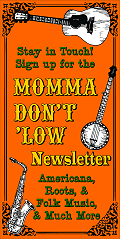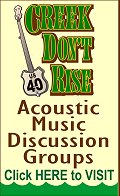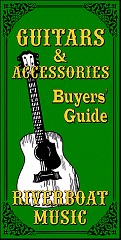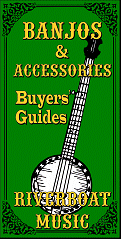
Pick up any old thing and join in!
| Please Read: How to Help Our Site at No Cost to You - Some of our articles contain recommendations for products we like and vendors we personally trust. Some of those vendors may pay us a very small commission if you click on a link and buy their products. This costs you nothing at all and helps offset the costs of what we do. So if we point you to something you decide to buy later, please make certain you come back through our site and click on the link directly. Thanks. |
| This Site is a Cookie-Free Zone - Except for discussion forums that you have to expressly register for, none of our pages use cookies of any kind. Some of the vendors we link to do, but that won't affect you unless you click on a link to their pages. Your continued use of this page indicates that you agree to our policy. For details, click here. |



|


What Are Folk Songs?
This is part of the "How To Folk" series of articles. In an effort to "jump start" your enjoyment of Folk music (and maybe reduce culture shock), we have provided a brief introduction to the kinds of songs and songwriters that embody "Folk" for most people interested in such things. .
Among Folk Music fans and artists, there are many different notions about what constitutes "Folk Music." Here are a few:
- Uknown Authorship - In its most basic, original usage, the term "Folk Music" applied to songs of uncertain or unknown authorship that had been passed down for generations. Foklorists Alan Lomax and John Jacob Niles "collected" many songs whose roots traced back to Europe, and which had gone through countless changes.
Many of the collected Folk songs were "public domain," meaning "free to publish without paying royalties." Scores of them found their way into the songbooks that Boomers used as schoolchildren, so many folks my age still remember these songs. Unfortunately they were replaced by original, forgettable material a few years later because the publishers wanted to seem "on trend," so later generations lack that grounding in tunes that have literally been tested by time.
- Rewrites Faithful to the Genre - To others, it still counted if it started as a traditional song, and any modern revisions or enhancements stayed within the musical parameters of the original genre. So Noel Stookey's version of "This Train" counts (though it is still under copyright.)
- Original Songs in Folk Style - To others, it still counts as "Folk" if it is played on acoustic instruments and written in a style that imitated traditional Folk tunes. So, to most people, most of the original songs by artists like Tom Paxton, Phil Ochs, Noel Stookey, Hedy West, Gordon Lightfoot, and Ian Tyson "count" as "Folk."
- Folk-Inspired - Though "Folk Rock" added drums and electric guitars, countless "Folk Rock" artists, like Roger McGuinn and John Sebastian (of the Byrds and the Lovin' Spoonful, repectively) would be the first to acknowledge their Folk roots, and to share acoustic stages with other Folk or Folk-influenced musicans.
- "Feel-Good," Singalong, or ??? - Some critics, fans, and musicians, tired of the arguments among people with different definitions of "Folk music," tried to come up with more general "definitions." They would say something like, "I think Folk music is any music that makes people feel like coming together and singing." Or "I think Folk music is anything that gives you a spirit of optimism when you sing it with other people."
Of course the latter rules out all those tragic ancient ballads that are definitely Folk songs in the strictest sense of the word. But at least they're trying to be inclusive and appealing to newbies.
- Crossover with Other Acoustic-Based Genres - Though the Folk Revival started out celebrating songs recorded in marginalized American communities like Southern prisons and isolated Appalachian communities, other acoustic-based styles and even musical genres eventually influenced the movement, including:
- Calypso ("Sloop John B")
- Bluegrass (with scores of shared tunes like "Shady Grove," "Worried Man Blues").
- Celtic (especially as performed by traditional Irish groups. Including "Whack Fol the Diddle" and "Gypsy Rover").
- Gospel (including songs that the Folk Revival borrowed outright, including "You Can Tell the World" and "Wait on the Water")
- Tunes from non-English-speaking cultures, including "Malaguena," "Moscow Nights," "Tzena, Tzena," and countless others.
Interestingly enough, in recent years, Celtic artists have begun incorporating Folk Revival tunes by people like Tom Paxton into their sets. So the "crossover" goes both ways.
To me, the "correct answer" is "all of the above." When I'm singing in a "Hootenanny" or other situation that is supposed to be Folk oriented and encourage participation, I usually lead rowdy songs, eminently singable songs in the first category, to encourage people to jump in. "Worried Man Blues," "Boil That Cabbage Down," and so on. That said, when I sing "out" I add selections from the first three categories to my originals.
Why I Use Mostly Public Domain Songs in my Lessons and Clinics - You'll also notice that my teaching materials focus mainly on the first category - public domain songs of unknown or uncertain authorship.
"Back in the day," I started doing that because pretty much everyone of my generation had grown up with those songs.
But even now, I don't like printing other artists' material without their permission. And if I have to teach those old songs (like "Crawdad," and "Darlin' Clementine") at the same time I'm teaching chords ands picking patterns, I consider that a bonus to the student.
Other Resources
This section will list other Folk song resources as we come to them. Current resources include:- What Folk Songs Should I Know or Know About? - a brief primer to the song highlights of the Folk Revival, especially songs that most Boomer musicans know very well but still stand the test of time.
- Old Timey Song Sheet - a two-page handout with the words and chords for several 2- and 3-chord Folk songs in the keys of G or D.
- What is Folk Music? - A much-expanded version of this article, on our CreekDontRise.com site.
- More to come
Conclusion
This is just an overview of the kinds of songs and - to some extent - people you're likely to encounter if you begin dabbling in Folk music. To people outside of the community, we may seem to be working with self-imposed limitations, or stuck in the distant past. But if you listen to a sampling of the songs I've listed above, you'll realize that there is incredible variety and depth to the genre. And room for all sorts of creativity.Wherever you are in your journey, welcome aboard.
*The traditional spiritual "Wait On the Water" was related to a popular superstition reported in John 5:4 that an angel would occasionally stir up the water in the Pool of Bethesda, and whoever plunged into the water first would be healed. In Pentecostal circles, this was taken as a metaphor. "Wait on the Water" meant, essentially, "Be ready to exercise faith when you sense that the Spirit is moving." As the song aged, its connection to John 5:4 was forgotten, and "Wait on" became "Wade in."
Sister Sites
 Other sites we started to keep this site from getting too big to be useful include:
Other sites we started to keep this site from getting too big to be useful include:
- CreekDontRise.com is a repository of articles about Folk music and the instruments on which it has been traditionally played.
The "Acoustic" page includes a long list of articles including maintenance and playing tips on all sorts of traditional acoustic instruments.
 RiverboatMusic.com is a buyers' guide for acoustic and traditional instrument from a musician's point of view, focusing on the uses, reliability, and practicality of various instruments, and not just the marketing hype about the shape of the fret markers or whatever.
RiverboatMusic.com is a buyers' guide for acoustic and traditional instrument from a musician's point of view, focusing on the uses, reliability, and practicality of various instruments, and not just the marketing hype about the shape of the fret markers or whatever.
For instruments like dulcimers that have mostly small manufacturers or cheap imports, we try to tell you what to look for, irrespective of brand.
 Momma Don't 'Low includes a free e-mail newsletter that discusses all of those topics above and more. We plan to include other features as time permits.
Momma Don't 'Low includes a free e-mail newsletter that discusses all of those topics above and more. We plan to include other features as time permits.
Note - If you wish to sign up for our newsletter and ask a question at the same time, please click on the Momma Don't 'Low newsletter button to learn more and to get a link to our signup form.
 PaulRaceMusic.com is the "landing page" for Paul's own musical endeavors, plus many memoirs and blogs about music and the music business.
PaulRaceMusic.com is the "landing page" for Paul's own musical endeavors, plus many memoirs and blogs about music and the music business.
 ClassicTrainSongs.com describes railroad songs that every train lover should know. Or at least know about.
ClassicTrainSongs.com describes railroad songs that every train lover should know. Or at least know about.
- SchoolOfTheRock.com has articles about Christian music, Christian music careers and performance, Christian living in general, and vintage saxophones, another of Paul's interests. This site has separate newsletters, etc., by the way - there isn't a lot of overlap with the Momma Don't 'Low(tm) newsletters.
For information about other music collections and projects, check the links at the bottom of this page.
 Whatever else you get out of our pages, I hope you come away with some great ideas for "sharing the joy."
Whatever else you get out of our pages, I hope you come away with some great ideas for "sharing the joy."
And please stay in touch!
All material, illustrations, and content of this web site is copyrighted (c) 2001, 2002, 2003, 2004, 2005, 2006,
2007, 2008, 2009, 2010, 2011, 2012, 2013, 2014, 2015, 2016, 2017, 2018, 2019, 2020, 2021, 2022, 2023 by Paul D. Race. All rights reserved.
Creek Dont' RiseTM is a participant in the Amazon Services LLC Associates Program, an affiliate advertising
program designed to provide a means for sites to earn advertising fees by advertising and linking to Amazon.com.
For questions, comments, suggestions, trouble reports, etc. about this page or this site, please contact us.
| Visit related pages and affiliated sites: | |||||
| - Music - | |||||

|
 |
 |

|

|

|

|

|

|

|

|

|

|

|

|

|

|

|
| - Trains and Hobbies - | |||||
 |

|

|  |
 |

|
| - Christmas Memories and Collectibles - | |||||
 |

|
 |

|
 |

|
| - Family Activities and Crafts - | |||||
 |

|

|

|

|

|

